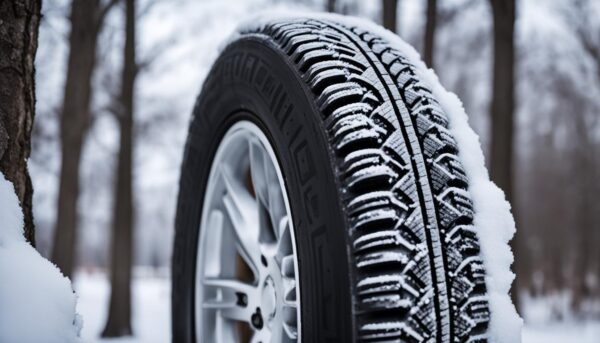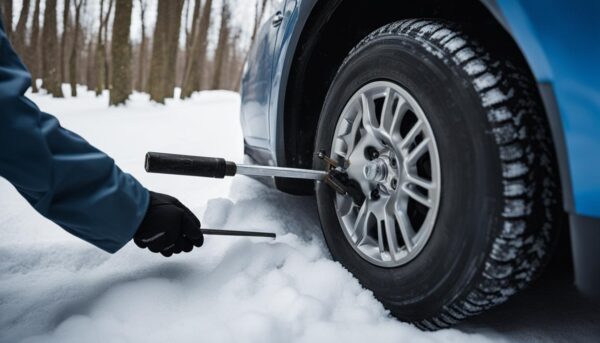Last Updated on 5 days
Exploring the Necessity of Snow Tire for Safe and Secure Winter Travel
With winter fast approaching, many drivers struggle to decide whether to invest in snow tires. Designed specifically for optimal traction during the harshest winter months, snow tires can make a world of difference in ensuring vehicle safety, performance, and handling. This comprehensive guide to snow tires will provide critical insight into their practicality and worthiness for winter driving conditions caused by snow, ice, and other hazardous elements. Get ready to enhance your winter driving experience with the help of this informative and expert-backed winter tire guide!
Key Takeaways
- The importance of snow tires in ensuring vehicle safety and handling during winter driving.
- Comparing the performance of snow tires versus all-season tires in cold weather conditions.
- Understanding winter tire laws and how they vary by state.
- Financial benefits of investing in snow tires, including long-term savings and potential impact on resale value.
- A guide to selecting the best snow tires for your specific needs and driving environment.
- Professional installation and seasonal maintenance tips for your snow tires.
Understanding the Necessity of Snow Tires for Winter Driving
Winter is a beautiful but challenging season, with unpredictable weather conditions threatening safe driving. With slippery roads and reduced visibility, drivers must be prepared for any scenario. In this section, we will discuss the necessity of snow tires and how they compare to all-season tires when navigating challenging winter conditions.
Confronting Winter’s Challenges: Snow Tires vs. All-Season Tires
All-season tires are designed to perform adequately in conditions like rain, dry roads, and mild snow. However, they can struggle to maintain their grip when faced with heavy snowfall or ice-covered roads. In contrast, snow tires have specifically engineered features that allow them to perform optimally in cold, wet, and snowy conditions. The table below compares the relative strengths of snow tires and all-season tires in various winter challenges:
| Winter Challenge | Snow Tires | All-Season Tires |
|---|---|---|
| Traction in Snow | Excellent | Average |
| Traction on Ice | Very Good | Poor |
| Braking Performance | Superior | Reduced |
| Handling in Cold Temperatures | Optimized | Compromised |
As the table above shows, snow tires offer significant advantages regarding traction, braking performance, and handling in cold and slippery conditions. For drivers who reside in areas with winter weather, investing in snow tires is crucial to ensuring road safety and maintaining vehicle control.
The Science of Traction: How Snow Tires Keep You Safe
Snow tires boast several unique features that optimize their performance in winter conditions. Two primary factors contribute to their increased grip and traction on snow and ice: deeper treads and specialized rubber compounds.
- Deeper Treads: Snow tires have deeper treads that enable them to bite into snow and ice more effectively. The unique tread patterns also help channel slush and water, reducing the likelihood of hydroplaning.
- Specialized Rubber Compounds: The rubber compounds used in snow tires are designed to remain flexible and maintain grip even in extremely cold temperatures. This flexibility allows snow tires to conform to the road surface and provide better traction than the stiffer rubber in all-season tires, which can become less effective in colder conditions.
“The increased grip and traction offered by snow tires not only enhance vehicle safety and control but also foster driver confidence when facing the challenges of winter.”
In conclusion, snow tires are vital in helping drivers navigate winter challenges safely and confidently. Their superior traction and handling capabilities make them necessary when preparing for the cold and snowy months ahead. By understanding the advantages of snow tires over all-season tires, drivers can make well-informed decisions prioritizing their safety and the well-being of others on the road.
Winter Tires and the Law: Knowing Your State’s Requirements
As the temperature drops and roads become slippery with snow and ice, drivers must understand and comply with their state’s winter tire laws and snow tire regulations. These state tire requirements are implemented to enhance road safety and reduce potential accidents during winter months. In this section, we’ll guide you through the legal landscape regarding winter tire usage across the United States.
Winter tire laws vary greatly by state and region, so be aware of the regulations specific to your location! Always equip your vehicle appropriately before hitting the road in snowy or icy conditions.
Winter tire requirements differ among states. Some mandate snow tires or tire chains during specific months, while others implement laws only during harsh winter weather. Moreover, some regions have no specific winter tire laws at all. To help you navigate through these varying state requirements, we’ve compiled a list of notable examples:
| State | Winter Tire Requirements |
|---|---|
| California | Drivers must carry chains when traveling on designated routes during winter months. Signs will be posted when in effect, and chains must be installed on at least two drive wheels. |
| Colorado | Between September 1 and May 31, all passenger vehicles must have snow or mud+snow-rated tires, tire chains, or an alternative traction device. |
| Michigan | There are no specific winter tire requirements, but drivers can face fines if they lack proper tires in winter conditions and cause an accident. |
| New York | While not mandated, winter tires are recommended from October 16 to April 30. |
| Washington | Drivers must follow the signage posted during winter conditions. Signs dictate the use of chains, snow tires, or studded tires, depending on the severity of the weather. |
While this list features only a few examples of state tire regulations, we highly recommend consulting your local Department of Transportation for more precise and up-to-date information about your region’s winter tire laws.
Remember, even if your state does not require winter tires, it’s vital to consider the benefits of equipping your vehicle with them to ensure maximum safety during harsh winter conditions. Adhering to state tire requirements and knowing the benefits of winter tires can improve road safety and your overall driving experience.
The Safety Benefits of Equipping Your Vehicle with Snow Tires
Going into the winter season, snow tires not only bring convenience to drivers but also offer significant safety enhancements. Understanding their role in preventing winter accidents is essential as drivers navigate challenging conditions on slippery, icy roads. This section discusses the benefits of snow tires in yielding increased safety measures and improving vehicle control for greater confidence in winter driving.
Preventing Winter Accidents: The Role of Snow Tire in Safety
The primary purpose of snow tires is to diminish the risk of winter accidents. Their specialized design helps drivers control their vehicles better in snowy and icy conditions, effectively reducing the likelihood of accidents. The key features contributing to this improved safety include:
- Deeper treads that optimize grip on slippery surfaces
- Specialized rubber compounds that remain flexible in cold temperatures
- Unique tread patterns that quickly expel slush and snow
By providing enhanced traction and grip, snow tires significantly reduce the risk of skidding or sliding, ensuring drivers can handle hazardous winter conditions better.
The Impact of Snow Tires on Vehicle Control and Peace of Mind
Investing in snow tires improves safety and offers peace of mind for drivers navigating wintry roads. Regardless of whether a vehicle has all-wheel drive or other traction-enhancing technologies, snow tires can elevate its performance, control, and handling in treacherous winter conditions. Some notable benefits include:
- Shorter stopping distances on slippery surfaces
- Better cornering ability on icy roads
- Improved acceleration and uphill drive
Confidence on the road is critical in maintaining safe driving habits, and snow tires give drivers the assurance they need to navigate through winter conditions securely.
“Snow tires are an essential investment in your safety and peace of mind during wintry months.”
| Feature | Snow Tires | All-Season Tire |
|---|---|---|
| Tread Depth | Deep | Shallow |
| Rubber Compound | Flexible in cold temperatures | Hardens in cold temperatures |
| Traction on Snow | Excellent | Mediocre |
| Traction on Ice | Good | Poor |
In conclusion, snow tires are vital in preventing winter accidents and enhancing vehicle safety. By offering improved grip and traction, these tires enable drivers to maintain better control and confidence in treacherous driving conditions.
Examining the Long-Term Savings of Snow Tire
While the upfront cost of snow tires might seem significant, it is important to consider the long-term savings that come with this investment. Acquiring dedicated snow tires can lead to cost efficiency and tire lifespan extension due to the following factors:
- Reduced wear and tear on all-season tires
- Lower risk of accidents and costly repairs
- Decreased impact on insurance premiums
Reduced wear and tear on all-season tires: By using snow tires during cold months, drivers can prolong the lifespan of their all-season tires. Since the all-season tires are not subjected to the harsh winter conditions and persistent use, they ultimately last longer, which translates to long-term savings.
Lower risk of accidents and costly repairs: Snow tires provide better traction and handling capabilities during winter conditions, significantly reducing the risk of accidents. Fewer accidents mean fewer expenses related to vehicle repairs and associated costs.
Decreased impact on insurance premiums: By employing snow tires to minimize the likelihood of winter accidents, drivers can experience a positive effect on their insurance premiums. Some insurance companies offer discounts for drivers using snow tires, acknowledging the reduced accident risk associated with their use.
“Investing in a set of high-quality snow tires not only enhances your safety and vehicle performance in winter but also proves to be cost-effective in the long run.”
Considering these factors, it becomes evident that snow tire investment offers both safety and long-term financial benefits worth their initial cost. By taking the time to research the right snow tire for your specific needs and winter driving conditions, you can maximize the potential return on your investment.
Evaluating Snow Tires as an Investment for Your Vehicle’s Resale Value
While snow tires undoubtedly provide safety benefits and peace of mind during winter driving, they also have the potential to enhance a vehicle’s resale value. Incorporating snow tires as an investment can boost your automobile’s market appeal, especially among prospective buyers in regions with challenging winter conditions.
How Snow Tires Can Enhance Your Vehicle’s Market Appeal
When it comes to selling a car, every detail matters. Today’s savvy buyers are increasingly interested in obtaining a vehicle with features that offer reliability, safety, and convenience. Snow tires are committed to these qualities and can create a competitive advantage in the market.
- Improved safety: Buyers may feel reassured knowing the previous owner prioritized minimizing the risk of accidents and enhancing the overall winter driving experience.
- Meticulous maintenance: Snow tires often suggest that the owner has diligently maintained the vehicle, leading potential buyers to trust that other components have also received proper care.
- Adaptability: Including an existing set of snow tires may enable potential buyers to imagine the vehicle seamlessly integrating into their driving needs, particularly in regions with challenging winter conditions.
Ultimately, investing in snow tires can be a strategic move that increases your vehicle’s resale value and strengthens its reputation among buyers in the market.
A penny saved is a penny earned, and investing in snow tires saves money in the long run and increases your vehicle’s market appeal when it’s time to sell.
| Aspect | Value Enhancement |
|---|---|
| Safety | Reassures buyers of the vehicle’s reliability and safety in winter conditions |
| Maintenance | Indicates proper care has been taken towards the vehicle’s upkeep |
| Adaptability | Encourages seamless integration into buyers’ driving needs in winter-prone areas |
In conclusion, showcasing snow tires as an investment in your vehicle’s resale value can benefit financial gains and enhance market appeal. By catering to potential buyers’ safety and convenience concerns, you ultimately increase the attractiveness of your vehicle and position it favorably within the competitive used car market.
Choosing the Best Snow Tires for Your Winter Needs

When winter approaches, it’s essential to equip your vehicle with the right snow tires to maintain safety and performance on snowy and icy roads. Selecting the perfect set for your needs might seem daunting, but with this tire purchase guide, you can choose the best snow tires for your specific driving conditions.
Consider the winter conditions you typically encounter to ensure a reliable winter tire selection. For instance, if you live in an area with heavy snowfall and freezing temperatures, prioritize tires designed to provide excellent traction on snow and ice.
Follow these steps to choose the right snow tire:
- Identify the type of winter conditions in your area (heavy snowfall, icy highways, slush, etc.)
- Research different snow tire brands and models
- Consult reviews and expert recommendations
- Consider your budget and preferred tire performance traits
- Choose tires that fulfill your specific winter driving needs
Before deciding, it’s essential to research various snow tire brands and models. Read reviews and observe expert recommendations, as these can provide valuable insights into tire performance and durability.
Remember: Purchasing high-quality snow tires is an investment in your safety and your vehicle’s performance.
Top-Rated Snow Tires for Different Winter Driving Conditions
Here’s a list of top-rated snow tires to help you make an informed choice.
| Winter Conditions | Best Snow Tires for Each Condition |
|---|---|
| Heavy Snowfall | Bridgestone Blizzak WS90, Michelin X-Ice Xi3 |
| Icy Highways | Goodyear Ultra Grip Ice WRT, Nokian Hakkapeliitta R3 |
| Mixed Slush, Snow, and Ice | Continental VikingContact 7, Pirelli Winter Sottozero 3 |
| Performance Winter Tires | Dunlop Winter Maxx WM01, Yokohama BlueEarth Winter V905 |
By diligently researching snow tire brands, models, and expert recommendations, you’ll be well-equipped to make the right choice for your winter needs. Remember to prioritize safety and performance by investing in high-quality tires that confidently address your driving conditions.
Crucial Factors to Consider When Purchasing Snow Tires
When investing in snow tires, several important aspects should be examined, such as the correct tire size, reputable brands, and balancing cost and performance. This section offers vital information to help you make an informed decision, ensuring optimal winter driving safety and performance.
Snow Tire Sizes and Your Car’s Performance
Proper tire fit significantly affects your vehicle’s performance, stability, and traction in winter. It is essential to invest in the right snow tire size to maintain control and driving quality:
- Refer to your vehicle’s owner’s manual for specific snow tire sizes and recommendations.
- Consult with a professional tire dealer for proper size and fit specifications.
- Be cautious when considering up-sizing or down-sizing your winter tires, as improper fit can negatively impact overall vehicle handling and safety.
Brand Recognition and Review: Navigating Snow Tire Options
There are abundant snow tire manufacturers on the market, making it challenging to determine which brands and models provide the best performance. Here are some tips for selecting top-rated winter tires:
- Research well-known tire brands such as Bridgestone, Michelin, and Goodyear for their proven track records and snow tire offerings.
- Look for reviews and testimonials from real users to gauge the performance of specific snow tire models.
- Consult with a professional tire dealer to discuss the best options for your vehicle and unique winter driving conditions.
Price Versus Performance: Striking the Right Balance for Winter Safety
Finding the perfect balance between affordability and performance is crucial when selecting snow tires. It is essential to invest in tires that provide necessary safety without breaking the bank:
“The cost of a tire is not always indicative of its performance or durability. Many mid-range tire options can provide excellent winter driving benefits at a more affordable price point.”
Consider the following when balancing cost and performance:
| Cost Factor | Performance Factor |
|---|---|
| Affordability of individual tires | Tire compound and treading optimized for winter conditions |
| Price range of reputable tire brands | Consistent positive reviews and real-world performance |
| Comparison shopping with sales or discounts | Confidence in tire performance based on dealer recommendations |
By thoroughly investigating these aspects, you can find the perfect snow tires to keep you and your vehicle safe during winter driving.
Professional Installation and Seasonal Maintenance of Snow Tires

Professional snow tire installation ensures that your vehicle is prepared for winter driving. Proper snow tire installation and fitting are essential for safety and tire longevity. It is also crucial to maintain your tires during their off-season storage. In this section, we cover both these important aspects.
The Importance of Expert Snow Tire Installation
Incorrectly installed snow tires can jeopardize your safety, vehicle performance, and the lifespan of your tires. Expert tire fitting services are essential since they:
- Ensure correct sizing and alignment for optimum traction.
- Prevent tire damage and premature wear during winter driving.
- Comply with manufacturer specifications and warranties.
Investing in expert tire installation services also frees you from the challenges of fitting new tires independently. While self-installation may seem cost-effective, the potential risks for mistakes and damage often outweigh the savings.
Opt for a professional tire installer to ensure your safety, the longevity of your snow tires, and the overall efficiency of your vehicle during winter driving.
Storing Snow Tires: Tips for Off-Season Care
Proper snow tire storage is crucial for preserving their condition and performance. Follow these essential off-season maintenance tips:
- Clean the tires – Thoroughly wash off dirt, salt, or debris from the tire treads and sidewalls before storing them.
- Wrap them up – Protect each tire with a weather-resistant cover or plastic bag to prevent moisture, sunlight, or ozone damage.
- Store indoors – Keep the tires in a cool, dry, and dark place, away from direct sunlight or heat sources.
- Maintain adequate air pressure – Check tire pressure regularly and maintain the recommended level, even during storage.
- Rotate occasionally – Rotate the tires to prevent flat-spotting or uneven wear.
Some tire shops offer seasonal storage services for additional convenience. Depending on your available space and budget, you might consider utilizing these services for hassle-free tire storage.
Expert tire fitting and seasonal tire maintenance are integral to preserving the performance and safety of your snow tires. Professional installation promotes efficient and secure tire fitting, while diligent off-season care helps prolong the life of your tires.
Conclusion
In this snow tire guide summary, we’ve covered the various aspects of snow tires that make them an essential investment for your winter preparedness. From understanding their necessity and unique technology to knowing your state’s legal requirements, we aim to provide you with the knowledge you need to decide whether snow tires are right for your vehicle.
With a focus on safety benefits and long-term savings, we explored how to choose the best snow tires for your specific driving needs and crucial factors to consider when purchasing. We also highlighted the importance of professional installation and seasonal maintenance to ensure optimal performance and tire longevity. These tips are essential for safe driving during the winter months, as snow and ice can pose various challenges on the road.
Ultimately, we hope this guide has provided you with valuable insights into the world of snow tires, and we encourage you to prioritize your safety by being well-prepared for winter driving. Equipping your vehicle with the right snow tires and taking the necessary precautions, you can confidently tackle winter roads and enjoy a safer driving experience.
FAQ
Are snow tires necessary for winter driving?
Snow tires are designed with deeper treads, larger tread gaps, and specialized rubber compounds to provide better traction in snow and icy conditions. Although all-season tires offer decent performance, snow tires are specifically engineered to handle harsh winter conditions and can significantly improve vehicle handling, control, and safety on slippery surfaces.
What is the difference between studded and non-studded snow tires?
Studded snow tires have metal studs embedded in the tread, which provides added grip on ice. A non-studded snow tire has unique tread patterns and rubber compounds designed to grip effectively on snow and ice without using metal studs. While studded tires provide exceptional traction on icy surfaces, they may be prohibited or limited in some areas due to potential road damage. Consult your state’s winter tire regulations to understand any applicable restrictions.
What are some top-rated snow tire brands?
Some of the most reputable snow tire manufacturers include Michelin, Bridgestone, Goodyear, Nokian, and Continental. Each brand offers a range of winter tire options catering to various budgets and driving conditions. Research reviews and recommendations for specific tire models before making your purchase decision.
Should I have snow tires installed professionally?
Professional installation is crucial to ensure proper tire fit and alignment, directly impacting traction, stability, and safety in winter driving conditions. Improper installation may also affect your snow tires’ lifespan. To ensure optimal snow tire performance and longevity, it is wise to rely on expert tire technicians for installation.
How do I store snow tires during the off-season?
Storing snow tires properly during the off-season is essential to maintain their condition and extend their lifespan. Clean and dry the tires thoroughly, then wrap them in airtight plastic bags or tire totes specifically designed for storage. Store the tires in a cool, dry, and dark indoor location without direct sunlight, heat, or humidity exposure. Some tire shops also offer storage services for added convenience.
Can snow tires improve my vehicle’s resale value?
Including snow tires with your vehicle may make it more appealing to potential buyers in winter-prone areas, showcasing responsible upkeep and an investment in safety. This can increase the perceived value of your vehicle and make it more attractive to prospective purchasers.










